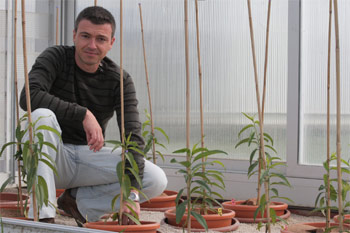Un estudio realizado en la Universidad de Navarra analiza el efecto del cambio climático en los melocotoneros
A study carried out at the University of Navarra analyzes the effect of climate change on peach trees.
The researcher of the Experimental Station classroom Dei-CSIC Sergio Jiménez analyzes more sustainable patterns for this crop.

The section of Plant Biology of the University of Navarra hosts a study on the effect of climate change on peach plants, a fruit tree that reaches 1.2 million tons of production in Spain in a cultivation area of 72,000 hectares. It is a work carried out by Sergio Jiménez, researcher of the Experimental Station classroom Dei-CSIC.
According to the scientist, whose project carries out with the group "Improvement, selection and characterization of woody species", climate change involves an increase in the concentration of CO2 in the atmosphere, rising temperatures and greater limitation for the availability of water by plants, "status that is affecting many crops adapted to certain environmental conditions. These stress factors jeopardize their sustainability in traditional growing areas," he warns.
His group collaborates with Manuel Sánchez-Díaz, director of the Section of Plant Biology of the School of Sciences of the University of Navarra -unit associated with the CSIC through the Experimental Station of classroom Dei of Zaragoza-, whose facilities are able to reproduce different environments resulting from combining the factors that will be altered with climate change in unique greenhouses in Spain. "In them we reproduce the conditions that will occur at the end of the century, such as the increase in environmental CO2 and temperature, as well as the restriction in the amount of water available, one of the most limiting effects in the Mediterranean area , which is very vulnerable to suffer water shortages," explains the specialist.
Adaptation: the best alternative
Precisely in this area, warns the researcher, "the use of species and varieties better adapted to the climatic and edaphological conditions is the best alternative, since it would allow reducing production costs and would favor a more sustainable use of scarce resources such as water".
"In the case of fruit trees," continues Sergio Jiménez, "the grafted variety is the one that provides the fruit that is harvested. This graft is made on a patron saint or rootstock that provides the roots of the tree and, with it, the adaptation to the soil". Now they are studying peach trees grafted on Prunus rootstocks of different genetic origin, to observe their response to the conditions derived from climate change.
In fact, there are already rootstocks adapted to some stress factors typical of the Mediterranean area -such as iron deficiency, replanting problems or nematodes-. However, having genotypes that are multi-tolerant to different types of stress is essential for a more sustainable agriculture," he stresses.
The trees used in this study are located in thermal gradient greenhouses developed by researchers from the Section of Plant Biology of the University of Navarra to simulate different climatic environments.
The work, funded by the Government of Aragon and Obra Social La Caixa, involves a dozen researchers from the Experimental Station classroom Dei and department of Plant Biology of the University of Navarra.
